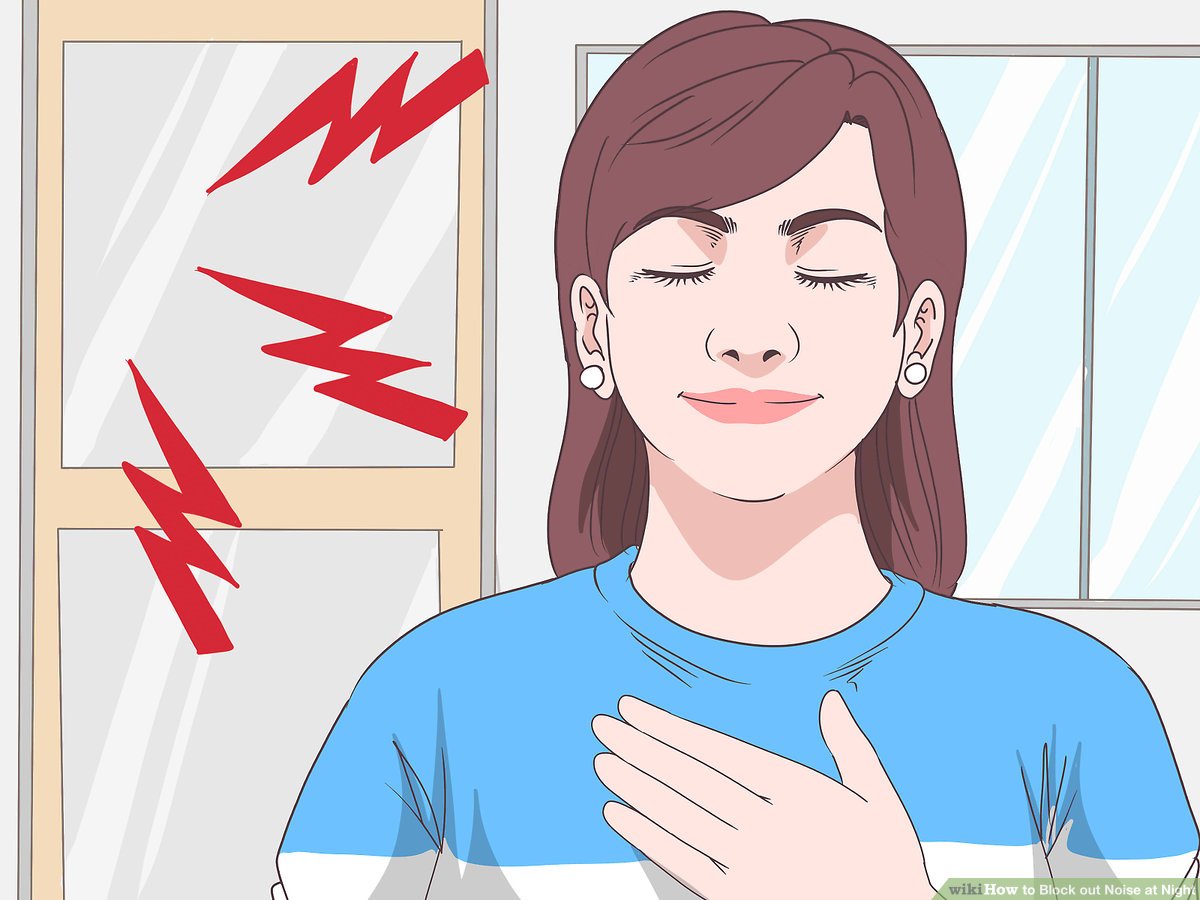You’ve had poor sleep lately but if you could just block out the noise at night that’s keeping you awake then you might finally be able to get some shut-eye…
If you’re unable to block out the noise that’s keeping you awake, it’s likely leading to low-quality sleep night after night. This can affect your work, relationships, and quality of life.
Luckily, there are lots of tried-and-true ways to block out annoying noises for good so you can fend off sleep deprivation.
Read on to learn nine ways to block out nighttime noise easily and effectively so you can finally get some peace and quiet.
(Note. While we earn commission from the links in this article, we only recommend the products we truly believe will improve your sleep the most. These commissions come at no extra expense to you and help us to keep providing you with expert sleep information for free.)
How Does Noise Affect Sleep?

If you’re having trouble falling asleep, you’re not alone. For many, the reason they can’t seem to get quality sleep is because they can’t block out the noise that keeps them alert at bedtime. Sound familiar?
Multiple studies confirm what you probably already know — noise has a negative effect on sleep quality.
Too much noise exposure at night is a dangerous game to play if you need to get up early the next day.
In the short term, you may feel the immediate effects and symptoms of a night of poor sleep like sluggishness or an inability to focus the next day.
In the long term, chronic sleep disturbance can impact your circadian rhythms and have serious mental and physical consequences.
It’s worth getting this problem solved ASAP.
9 Methods to Block Out The Noise That Keeps You Awake At Night
There’s great news if you want to block out the unwanted noises that are leading to your disturbed sleep. Whether it’s just background noises or a howling neighbor’s dog, there are solutions.
Noise sensitivity varies from person to person but here are nine things everyone can do today to solve this problem and get back to optimal sleep quality tonight.
1. Invest in a white noise machine
Not all noise exposure is bad — white noise can be good.
White noise is a combination of sounds of all frequencies audible to the human ear. Think of the sound of TV static, a heavy rain, or someone saying ‘shhhh’.
White noise can help you sleep because masks jarring sounds that might keep you awake.
You don’t need to turn your TV on to the static channel to get white noise though.
You can pick up a white noise machine like the Dohm Uno Noise Machine. Switch it on at bedtime to help cover those neighbors’ conversations or that tick, tick, tick of your clock.
2. Try wearing ear plugs
Ear plugs have been around forever.
Pop these in before bed to help dull or completely block out the noise in your environment to see a big difference in sleep compared to unplugged ears.
While earplugs may not block out your wannabe rockstar partner with their stereo volume maxed out, they can almost completely block some of the small disturbing sounds that keep you awake at night and help you get that 7-9 hours of sleep that you need.
Earplugs typically have a noise reduction rating that blocks out sounds up to 39dB, or the hum of a refrigerator.
3. Listen to soothing music with bedphones

Studies show that listening to soothing music before sleeping improves subjective sleep quality and increases the amount of slow-wave sleep (deep sleep) that you’ll get.
Nowadays, there are some really cool headphones, or rather bedphones, that are made especially for sleeping. They are small and lightweight and often have timers and other intelligent noise reduction options.
Check out these bedphones by Moonbow. They are super lightweight, wireless and can be molded to fit you perfectly.
4. Put on sounds of nature

Once you’ve got your new bedphones, try turning on some soothing nature sounds. There is solid evidence of the link between listening to the sounds of nature and sleep. Perhaps nature is music to your ears.
These are the sounds that our brain evolved to sleep with. Going back to nature triggers natural responses, like sleep.
Skip the howler monkeys and crashing thunder and opt for crickets and a delicate afternoon rain to help you drift off peacefully.
5. Practice a guided meditation

Experimental evidence shows the benefits of mindfulness meditation and breathing exercises on stress, blood pressure and psychological well-being. If you’re feeling stressed from too much noise, meditation can help calm you down.
Meditation has a host of benefits on our general health and notably it can be an effective treatment against sleep disturbances.
Controlling your breath and breathing with intention can help you to control your anxiety surrounding bedtime noise. Simple relaxation can work wonders.
Try blocking out noise with a sleep meditation video and follow the lead of the master to help you learn how to refocus your thoughts away from those disturbances and toward getting a good night’s sleep.
6. Buy noise-cancelling earphones
Recent studies are showing major benefits on sleep quality for patients who wear noise-cancelling earphones.
Noise-cancelling headphones work by listening outside sounds and then playing the opposite sound to cancel out the external noise.
There are sleek options that can fit your head to help make things more comfortable.
7. Speak to noisy neighbors

Even though this option is the cheapest and, if successful, could solve all of your sleep disturbance problems, it’s the most difficult.
A neighbor isn’t just a random person. You may have to live next to them for twenty plus years.
Navigating this conversation tactfully is important, not only to stop unwanted noise now, but also to stop future potential noise.
Steer clear of banging on the wall to let your neighbors know about your frustration and try approaching your neighbors politely but candidly.
Appeal to their sense of empathy.
The chances are that they may not even realize they are disturbing you and would gladly keep the volume down during sleep hours.
8. Hang heavier curtains
This may seem like something you’d do if you want to block the light (and it can be) but it’s also a great way to block out the noise that’s keeping you up.
Imagine how much a soft chiffon curtain can muffle outside noises compared to a thick, heavy velvet curtain. The velvet one wins.
Consider talking with your local interior decorators to help you choose a heavier fabric to block out noise. There are plenty of functional stylish options plus you can give your bedroom a mini-makeover!
9. Put up soundproofing in the bedroom
There are lots of easy ways to soundproof your bedroom that start with identifying the sources of the sounds and doing what you can to minimize them.
If you have a clock that goes tick tock all night, consider swapping it for something quieter. If your bed is backed up against a wall with a noisy neighbor, try reconfiguring your room set up to move your headboard.
Include more soft, plush things in your decor to help reduce echoes. You can also get something to put under your door to help muffle sounds from outside.
Alternatively, try adding soundproofing panels to your walls.
In Summary
Trying to block out the noise that keeps you up is easy with a few of these tactics. If you’re tired of playing games with your sleep, try these solutions to reduce unwanted noises.
Chronic sleep disturbances can lead to all sorts of nasty health consequences down the line so it’s important that you take action to block noise and get some restful sleep while you still can.
Don’t put up with loud noises disturbing the peace. Block out the noise with a Dohm Uno Noise Machine.

Welcome to Snoozerville! I’m Dr. Alex Hartley, your guide to the world of restful sleep. With a Ph.D. in Sleep Science and years of experience as a sleep therapist, I’ve dedicated my life to understanding and improving sleep quality. My passion lies in uncovering the mysteries of sleep and sharing practical, science-backed advice to help you achieve the best rest possible. Beyond my academic pursuits, I’m an advocate for mindfulness and relaxation techniques, which I incorporate into my daily routine. At Snoozerville, I aim to transform your nights, combining the latest research with easy-to-implement tips. Whether you’re a chronic insomniac or just looking to improve your sleep hygiene, join me on this journey towards peaceful, rejuvenating sleep.



